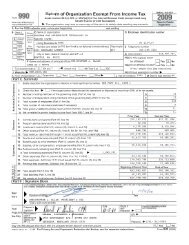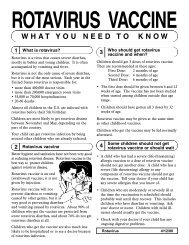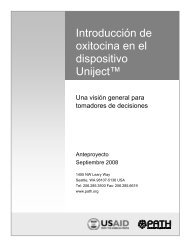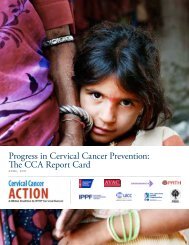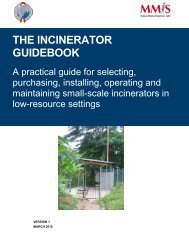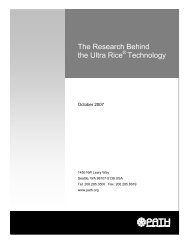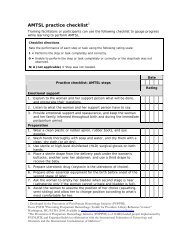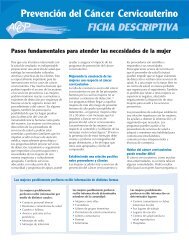Tuko Pamoja: A Guide for Peer Educators (entire - Path
Tuko Pamoja: A Guide for Peer Educators (entire - Path
Tuko Pamoja: A Guide for Peer Educators (entire - Path
Create successful ePaper yourself
Turn your PDF publications into a flip-book with our unique Google optimized e-Paper software.
Menstruation and ovulation<br />
Menstruation happens <strong>for</strong> most women about once a month, and that is why it is commonly called<br />
the “monthly period.” It usually lasts between three and seven days. It is a sign that a girl or woman<br />
can become pregnant any time she has sexual intercourse. Menstruation stops when women are<br />
pregnant and breastfeeding.<br />
Just as some girls begin puberty earlier or later than others, the same is true <strong>for</strong> periods. Some<br />
girls may begin to menstruate as early as age 9 or 10, but others may not start their period until<br />
a few years later. A woman knows that she has started her period when a little blood comes out of<br />
her vagina. The blood does not come out like water from a tap. It comes out slowly, like a dribble.<br />
Usually by the time she has noticed a feeling of unusual wetness, her panties have absorbed any<br />
blood that has come out. It is important to know when she will start her period each month so she<br />
can wear a sanitary pad or other protection to prevent the blood from staining her clothing.<br />
The amount of blood that comes out of the vagina is different <strong>for</strong> each woman. Usually, an <strong>entire</strong><br />
period only has a few to several spoonfuls of blood. The blood often starts off as a brown colour and<br />
then gets redder. It lightens to a brownish colour again until it stops. The amount of blood can also<br />
be different from day to day, some days there will be more blood than others.<br />
The menstrual cycle is the period of time beginning on the first day of a woman’s period until the<br />
day be<strong>for</strong>e she begins her next period. Since this happens regularly, it is called a cycle. The length<br />
of the menstrual cycle (the time between one period and the next) is different <strong>for</strong> each woman. For<br />
some, the cycle is as short as 21 (or even fewer) days. For others, it is as long as 35 days or more.<br />
Irregular periods are common in girls who are just beginning to menstruate. It may take the body<br />
a while to adjust to all the changes taking place.<br />
For example, a girl may have the same length cycle <strong>for</strong> two months, then miss a month, or have two<br />
periods with fewer days in between them. Her menstrual cycle will probably become more regular,<br />
although she may continue to have irregular periods into adulthood. Sometimes she might have some<br />
spotting of blood <strong>for</strong> a day or two in the middle of her cycle. This is usually nothing to worry about. It<br />
is important to note that a regular menstrual cycle can become irregular with stress or infections.<br />
Ovulation is the release of an egg from the ovary. The time from ovulation to the next period is 12<br />
to 16 days and is controlled by hormones. The two weeks or so be<strong>for</strong>e ovulation and the two weeks<br />
after make a menstrual cycle about four weeks or a month in length.<br />
Girls can sometimes notice a whitish liquid on their underpants or feel wetness. Girls often notice<br />
this liquid around the time of ovulation, when the body is ready to receive and nurture a fertilized<br />
egg. This liquid helps sperm travel through the uterus to meet the egg to become fertilized. Paying<br />
attention to vaginal liquid helps girls understand their bodies. Knowing what is normal <strong>for</strong> the<br />
body helps girls know when things are not normal. For example, yellow or strong-smelling liquid is<br />
not normal. This can be a sign of infection, and she should visit a health worker.<br />
Menopause<br />
Menopause is when a woman’s menstruation ends. It ends because the hormones that cause eggs to<br />
mature in her ovaries stop. When this happens, women can no longer become pregnant. Menopause<br />
usually happens when women are around age 45. But, menopause can take place earlier or later than<br />
this. Some women may stop menstruating when they are 35 and some not until they are over 50.




